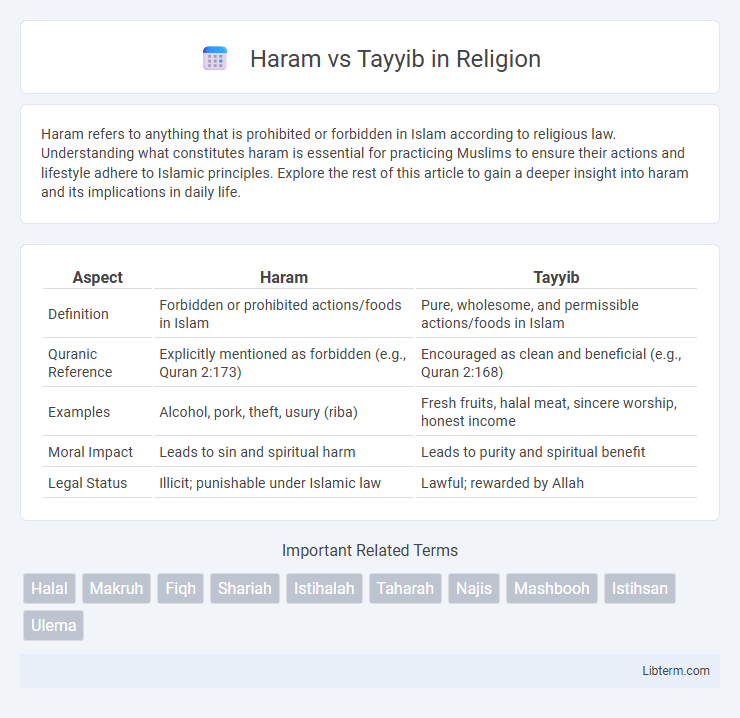Haram refers to anything that is prohibited or forbidden in Islam according to religious law. Understanding what constitutes haram is essential for practicing Muslims to ensure their actions and lifestyle adhere to Islamic principles. Explore the rest of this article to gain a deeper insight into haram and its implications in daily life.
Table of Comparison
| Aspect | Haram | Tayyib |
|---|---|---|
| Definition | Forbidden or prohibited actions/foods in Islam | Pure, wholesome, and permissible actions/foods in Islam |
| Quranic Reference | Explicitly mentioned as forbidden (e.g., Quran 2:173) | Encouraged as clean and beneficial (e.g., Quran 2:168) |
| Examples | Alcohol, pork, theft, usury (riba) | Fresh fruits, halal meat, sincere worship, honest income |
| Moral Impact | Leads to sin and spiritual harm | Leads to purity and spiritual benefit |
| Legal Status | Illicit; punishable under Islamic law | Lawful; rewarded by Allah |
Defining Haram and Tayyib: Key Islamic Concepts
Haram refers to actions, foods, or behaviors explicitly prohibited in Islamic law due to their harmful nature or divine injunctions, such as consuming pork or engaging in theft. Tayyib, in contrast, denotes what is pure, wholesome, and permissible, emphasizing cleanliness, ethical sourcing, and beneficial qualities in food and conduct. Understanding these concepts is essential for Muslims to maintain spiritual purity and comply with Shariah guidelines in daily life.
Historical Context: Origins of Haram and Tayyib
The concepts of Haram and Tayyib originate from Islamic jurisprudence, rooted in the Quran and Hadith as fundamental categories distinguishing forbidden (Haram) and permissible (Tayyib) actions or items. Historically, Haram signifies actions or consumables explicitly prohibited by Islamic law due to moral, health, or social reasons, such as consuming pork or alcohol. Tayyib refers to things that are not only lawful but also wholesome, pure, and beneficial, emphasizing ethical and spiritual cleanliness alongside permissibility.
Quranic Guidance on Haram and Tayyib
The Quran clearly distinguishes between haram (forbidden) and tayyib (pure and wholesome) foods and actions, emphasizing that believers should consume what is tayyib while avoiding all haram substances, such as pork and alcohol (Surah Al-Baqarah 2:168-173). Quranic guidance instructs that only tayyib provisions, which are lawful and beneficial, lead to spiritual purity and acceptance by Allah (Surah Al-Mu'minun 23:51). This divine framework encourages Muslims to seek halal sources and reject haram elements to maintain both physical health and moral integrity.
Common Examples of Haram and Tayyib in Daily Life
Haram refers to actions or foods strictly prohibited in Islam, such as consuming pork, alcohol, or engaging in dishonest behavior, while Tayyib denotes halal and wholesome items like fresh fruits, clean water, and ethically sourced meat. Common daily examples of haram include eating non-halal meat, gambling, and lying, whereas Tayyib encompasses meals prepared with permissible ingredients, fair trade products, and maintaining purity in consumption. Understanding the distinction between Haram and Tayyib guides Muslims in making ethical, spiritually compliant choices in everyday living.
The Role of Intention in Classifying Actions
The role of intention in classifying actions as Haram or Tayyib is fundamental in Islamic jurisprudence, where actions are judged not only by their external nature but also by the internal purpose behind them. An act deemed Tayyib (pure and lawful) requires sincere intention aligned with Islamic ethical principles, while actions performed with harmful or selfish motives may be classified as Haram (forbidden) regardless of their outward appearance. This distinction emphasizes that the moral value of an act is deeply rooted in the individual's conscious intention, guiding Muslims to cultivate purity of heart and mindfulness in their daily practices.
Food and Consumption: Haram vs Tayyib Standards
Haram foods are explicitly prohibited in Islamic dietary laws, including pork, blood, and alcohol, as well as improperly slaughtered animals, while Tayyib foods signify not only halal compliance but also purity, wholesomeness, and ethical sourcing. Consumption standards for Tayyib emphasize cleanliness, nutritional benefit, and humane treatment of animals, ensuring food is healthy, safe, and morally sound for Muslims. Adhering to Tayyib criteria promotes spiritual and physical well-being, reflecting a comprehensive approach to permissible food beyond mere legal permissibility.
Ethical and Spiritual Impacts of Haram and Tayyib
Consuming haram (forbidden) items disrupts ethical integrity and spiritual purity, leading to guilt, anxiety, and a weakened moral compass in individuals practicing Islam. Tayyib (pure and wholesome) choices promote spiritual well-being, reinforcing ethical behavior and strengthening the individual's connection with God. Emphasizing tayyib consumption nurtures inner peace, societal harmony, and alignment with Islamic ethical principles.
The Role of Scholars in Defining Boundaries
Scholars play a crucial role in defining the boundaries between Haram (forbidden) and Tayyib (pure and permissible) by interpreting Islamic jurisprudence and Hadith to provide clear guidance to the Muslim community. Their expertise ensures that dietary, financial, and behavioral practices align with Sharia law, safeguarding believers from engaging in prohibited acts while promoting ethical consumption and conduct. The dynamic nature of contemporary issues requires scholars to continually re-examine classical texts and issue fatwas that adapt to modern contexts without compromising fundamental Islamic principles.
Modern Challenges: New Dilemmas in Haram and Tayyib
Evolving dietary trends and globalization present new dilemmas in distinguishing Haram and Tayyib foods, as ultra-processed ingredients and synthetic additives complicate traditional Islamic dietary laws. Modern food production often blurs the line between what is permissible and pure, raising concerns about cross-contamination, genetically modified organisms (GMOs), and unclear sourcing that challenge strict adherence to Tayyib standards. Addressing these issues demands updated scholarly interpretations integrating contemporary food science and Islamic jurisprudence to ensure halal certification remains both valid and ethically sound.
Encouraging Tayyib Living in a Contemporary World
Promoting Tayyib living emphasizes consumption of wholesome, pure, and ethically sourced foods that support health and environmental sustainability in the contemporary world. Choosing Tayyib fosters physical well-being and spiritual harmony, aligning daily habits with Islamic principles of cleanliness and accountability. Integrating Tayyib practices encourages mindful eating, reduces reliance on harmful Haram products, and nurtures a balanced lifestyle compatible with modern challenges.
Haram Infographic

 libterm.com
libterm.com